June 7, 2023
Newsletter MAFR - Law, Compliance, Regulation

♾️suivre Marie-Anne Frison-Roche sur LinkedIn
♾️s'abonner à la Newsletter MAFR Regulation, Compliance, Law
____
► Référence complète : M.-A. Frison-Roche, "Message personnel", Newsletter MAFR Law, Compliance, Regulation, 7 juin 2023.
____
📧Lire par abonnement gratuit d'autres news de la Newsletter MAFR - Law, Compliance, Regulation
____
🔴 Message personnel sur la construction du Droit de la Compliance
____
📧lire l'article ⤵️
June 6, 2023
Newsletter MAFR - Law, Compliance, Regulation
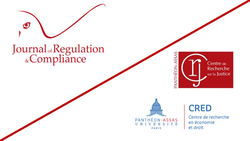
♾️suivre Marie-Anne Frison-Roche sur LinkedIn
♾️s'abonner à la Newsletter MAFR Regulation, Compliance, Law
____
► Référence complète : M.-A. Frison-Roche, "Compliance : obligation, devoir, pouvoir, culture (colloque 13 et 14 juin 2023)", Newsletter MAFR Law, Compliance, Regulation, 6 juin 2023.
____
📧Lire par abonnement gratuit d'autres news de la Newsletter MAFR - Law, Compliance, Regulation
____
🔴 Comprendre l'Obligation de Compliance afin d'en maîtriser la pratique (colloque des 13 et 14 juin 2023 du Journal of Regulation & Compliance (JoRC), du Centre de recherche sur la justice et le règlement des conflits (CRJ) et du Centre de recherche en économie et droit (CRED) de l'Université Paris Panthéon-Assas).
La compliance parait inmaîtrisable dans sa diversité et son ampleur et l'on doute parfois de sa juridicité.
Pour favoriser la maîtrise de cette pratique et construire le Droit de la Compliance, il est essentiel de mieux cerner l'Obligation de compliance.
C'est l'objet de ce colloque.
____
📧lire l'article ⤵️
June 2, 2023
Conferences

🌐follow Marie-Anne Frison-Roche on LinkedIn
🌐subscribe to the Newsletter MAFR Regulation, Compliance, Law
____
► Full Reference: M.-A. Frison-Roche, Le rôle du Juge dans le déploiement du Droit de la Régulation en Droit de la Compliance (The role of the Judge in the deployment of Regulatory Law in Compliance Law), in Conseil d'État (French Administrative Supreme Court) and Cour de cassation (French Judiciaire Supreme Court of cassation), De la Régulation à la Compliance : quel rôle pour le Juge ? ("From Regulatory to Compliance : what role for the judge?"), speech constituting the "closing session" of the bi-annual joint symposium of the two High Courts, held at the Conseil d'Etat, Salle d'Assemblée générale, 2 June 2023.
The event was held in French.
____
🧮See the full programme of this event (in French)
____
🎥watch the interview given about the conclusion, done after the speech (in French)
____
🧮read the general programme of the manifestation (in French)
____
📚read the bibliographical dossier du participant. (participant's file made in French)
___
🎥watch the general introductory speechs of Didier-Roland Tabuteau, Vice-Président du Conseil d'Etat, de Christophe Soulard, Premier Président de la Cour de cassation, and of François Molins, Procureur général près la Cour de cassation ; and the interventions in the first session devoted to the path from the Regulatory to the Compliance with Marie-Anne Barbat-Layani, présidente de l'AMF, Jean-Yves Ollier, conseiller d'Etat, Daniel Calleja-Crespo, directeur général du service juridique de la Commission européenne andChristine Guegen, , première avocate générale de la chambre commerciale de la Cour de cassation
____
🎥watch the speechs in the second session devoted to the office of the judge with Vincent Vigneau, président de la chambre commerciale de la Cour de cassation, François Ancel, conseiller à la première chambre civile de la Cour de cassatin, Astrid Mignon-Colombet, avocate à la Cour, Lucien Rapp, professeur à Toulouse-Capitol and Alain Seban, conseiller d'Etat ; the speechs of the third session dedicated to the Compliance new frontiers, with Christophe Chantepy, président de la section du contentieux du Conseil d'Etat, Roch-Olivier Maistre, président de l'Arcom, Paul Nihoul, juge au Tribunal de l'Union européenne, Jean-François Bohnert, procureur de la République financier, Joëlle Tolédano, professeure émérite à Dauphine ; the final session with Marie-Anne Frison-Roche
____
🎥watch this final speech by Marie-Anne Frison-Roche, which formed the closing session of the event
____
🚧read the bilingual Working Paper used as basis for the article to be published later
____
____
► English presentation of this general conclusion: Having a definition of Compliance Law in mind, a definition around which there still seems to be so much dispute, is not required to understand that this Law is what will enable us to enter and deal with a new world and if this subject is so fascinating to young people who want to become lawyers, prosecutors, regulators or judges, even though they are not taught this subject, it is because they have understood that with Compliance Law they will be able to actively participate in this new world and build it. This is the way we want it to take it, with force and courage in a sort of collective adventure. In this way, the Judges have a monumental role to play, which is at the very heart of Compliance Law.
They will necessarily be so because demands and claims will converge on them from all sides, from Internet users, consumers, investors, associations and companies, and the Judge will have to respond. This has already started and is only just beginning. Judges must be prepared.
Four expectations are emerging as to what their role should be.
Firstly, judges must persist in their role as guardians of the Rule of Law, in a Compliance Law impregnated with technologies (algorithms) that could be described as insensitive.
Secondly, beyond this vital role as guardian of the Rule of Law, the Judge has a new role in the extraordinary deployment of Compliance Law, which is measured in terms of the novelty of the normative control it exercises, the commitments it supports, the remedies it finds and the sustainability it reinforces.
Thirdly, in the natural space of justice, the judge responds to parties who make claims of compliance, both as plaintiff and defendant, because the causes of compliance are systemic causes that deserve a new jurisdictional treatment.
Fourthly, given the novelty and scope of this innovative approach, all judges must converge in terms of content, qualifications, and methods if they are both to continue their traditional role as guardians of the Rule of Law and to be able to endure their new role, a dialogue in which they have so much to contribute to each other.
________
May 29, 2023
Newsletter MAFR - Law, Compliance, Regulation
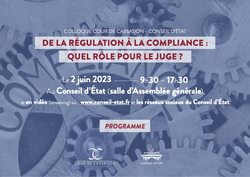
♾️suivre Marie-Anne Frison-Roche sur LinkedIn
♾️s'abonner à la Newsletter MAFR Regulation, Compliance, Law
____
► Référence complète : M.-A. Frison-Roche, "Compliance-Vigilance-Régulation : que feront les juges demain ? Juges administratif, civil, pénal, commercial, européen, etc. Colloque 2 juin 2023", Newsletter MAFR Law, Compliance, Regulation, 29 mai 2023.
____
📧Lire par abonnement gratuit d'autres news de la Newsletter MAFR - Law, Compliance, Regulation
____
🔴 Ce que les juges ont à nous dire sur la Compliance et la Régulation (2 juin 2023)
Chacun perçoit que les juges sont très puissants dans le Droit de la compliance, par exemple dans le numérique ou en matière de vigilance. Ils le sont aujourd'hui, le seront encore plus demain. Mais comment vont-ils exercer cette puissance, comment conçoivent-ils leur rôle, comment vont-ils exercer leur office face aux régulateurs, aux entreprises, aux personnes impliqués dans des systèmes technologiques qui risquent de nous dépasser ? Le 2 juin 2023 le Conseil d'État et la Cour de cassation se réunissent pour discuter et formuler le rôle du juge dans ce passage qui s'opère du Droit de la régulation au Droit de la compliance. J'attends d'apprendre à travers ce que je vais écouter toute la journée et explicite ici le contenu, les enjeux et les modalités d'inscription de ce colloque conçu par nos deux Hautes juridictions.
____
📧lire l'article ⤵️
May 25, 2023
Conferences

♾️ flollow Marie-Anne Frison-Roche on LinkedIn
♾️subscribe to the Newsletter MAFR Regulation, Compliance, Law
____
► Full Reference: M.-A. Frison-Roche, "Conclusions", in Ch. Maubernard et A. Brès (dir.), Institut de droit européen des droits de l'homme et Centre de droit de l'entreprise, Université de Montpellier, Le devoir de vigilance des entreprises : l'âge de la maturité?("The Entreprises duty of vigilance: the maturity age?") , Montpellier, May 25, 2023.
The conference is held in French.
____
🧮see the manifestation programme (in French)
___
🌐 read the report done on LinkedIn (in French)
___
► English summary of this final speech of the manifestation: It is rather difficult to draw a conclusion after listening so many contributions. For three reasons: firstly, because of their richness and extreme diversity; secondly, because of the fact that we do not know whether the duty of vigilance is under the French law of 2017 (known as the Vigilance Law) or in other national, European and international texts or beyond or below the legal rules; thirdly, because we do not know what is meant by the "maturity" of a legal concept. But in the end, since the question posed by the title itself of the colloquium is Duty of Vigilance: the age of maturity? the answer is clearly: no.
But this is regrettable. It is therefore essential to explore the ways in which the duty of vigilance can mature. If we find merit in this duty which has now entered the legal system, there are eight intersecting avenues, which must be exploited.
The first path is progression through the passage of time, rediscovering what in the past was already vigilance and what in the future will be its deployment.
The second way is to progress by fixing the vocabulary, because we are witnessing a great battle of words, overtly or covertly, in French or English.
The third path is progression through the emergence of principles, or even a principle, rediscovered or invented.
The fourth path is progression through coherence brought to the legal system(s), which at present suffer from gaps and inconsistencies, which could be remedied by methods such as centralising litigation or, more radically, ignoring borders.
The fifth path is progression through the fact that it works, because vigilance techniques are those of Compliance, of which vigilance is the leading edge, and the challenge is to find solutions.
The sixth path is progression through using power of the legal system not only to create new areas of relevance - starting with the notion of vigilance, but also that of the value chain - but also to impose new indifferences, namely indifference to the figure of the market (to which laws prefer the company and the value chain) and indifference to borders.
The seventh path is progression through bringing perspectives closer together, in order to find solutions even when interests are opposed. This is where the two techniques of contract and mediation are very welcome.
The eighth path is progression through culture, because the culture of vigilance, like the culture of compliance, must be developed within companies and supply chains, and must become common to them and their stakeholders.
____
________
May 11, 2023
Publications
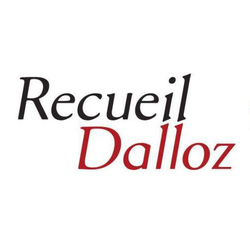
♾️ follow Marie-Anne Frison-Roche on LinkedIn
♾️ subscribe to the Newsletter MAFR Regulation, Compliance, Law
____
► Full Reference: M.-A. Frison-Roche, "La loi, la compliance, le contrat et le juge : places et alliances" ("Regulations, Compliance, Contracts, and Judges: places and alliances"), Chronique of Compliance Law, D. 2023, p. 906-908.
____
📝read the article (in French)
____
► English summary of this article: Compliance Law brings together the forces of regulations, contracts, and judges' decisions to achieve monumental goals so that in the future human beings will not be crushed by systems but will instead benefit from them. In this teleological and systemic branch of Law, legislators, regulators, companies, stakeholders, and judges must find their place. This can lead to bonds of obedience, a vision of 'conformity'. But conformity is only a tool of compliance, whose vigilance is the advanced point of this new branch of Law in which the alliance makes it possible to find solutions, the contract being then a usual mode of elaborating means under the control of the judge.
____
🚧read the bilingual Working Paper which is the basis of this article, with additional developments, technical references and hyperlinks
____
📚read the other articles published in this chronique of Compliance Law published in the Recueil Dalloz
________
May 11, 2023
Adventures of the Ogre Compliance

► Référence complète : E. Piana, E. et P. Utho, L'Épervier Vigilance et le pays au nom oublié, 2023, Éditions du Journal of Regulation & Compliance (JoRC), coll. "Les Aventures de l'Ogre Compliance", 63 p.
____
🛒 cette collection est utilisée dans les structures pour diffuser une culture de compliance. Pour plus d'information, contacter le Journal of Regulation & Compliance
____
📚 Cet ouvrage est le deuxième de la collection créée par Marie-Anne Frison-Roche au sein du Journal of Regulation & Compliance (JoRC).
___
► Présentation de la collection : Sous la direction du professeur Marie-Anne Frison-Roche, le Journal of Regulation & Compliance (JoRC) publie de l’information technique sur le Droit économique, de la Régulation et de la Compliance. Parce que cette matière paraît souvent inaccessible, réservée aux spécialistes, mais aussi très ennuyeuse ! Marie-Anne Frison-Roche lance une collection : Les Aventures de l’Ogre Compliance.
Même un enfant peut y comprendre la lutte contre la corruption, le lancement d’alerte, les conflits d’intérêts, la gouvernance de l’espace digital, la protection de l’environnement, les techniques de règlements des différends. Mais pour cela, il faut affronter le terrible Ogre Compliance… Peut-être Beau Fifi viendra-t-il à l’aide du lecteur de tout âge ?
____
► Présentation de l'ouvrage par sa quatrième de couverture :
L'Épervier Vigilance a un regard magique : il voit tout, comme s'il était à côté de toute chose et de chacun.
Ce qu'il voit, l'Épervier Vigilance le raconte à son ami de toujours : Supérieur, qui, au dernier étage de la Haute et Grande Tour, fait fabriquer de merveilleux jouets.
Un jour durant son vol, Vigilance aperçoit au loin un étrange Pays dont nul ne se souvient du nom. L'enfant qu'il y découvre ne parle pas, occupé tout le jour et toute la nuit à couper du bois qui servira à fabriquer des jouets.
Comment raconter cela à Supérieur, qui l'attend pour dîner ? L'Ogre Compliance qui vit dans la Haute et Grande Tour va-t-il s'en mêler ? Et Supérieur, que fera-t-il quand il apprendra cela ?
► Les articles publiées :
►au regard de son innovation pédagogique :
📝lire
► au regard de son intimité entre le Droit et la Littérature :
📝 la r
► au regard de son apport dans le Droit économique :
Dans sa rrences dans ses Antitrust Compliance Awards au titre de son caractère innovant.
____
🎥 Regarder
____
► Quelques réactions personnelles à ce premier ouvrage de la Collection des Aventures de l'Ogre Compliance :
 💬 "J'ai jeté un regard distrait sur ce petit bouquin. Déjà que le précédent valait pas grand chose, mais au moins on y parlait de moi, le si attractif Crapaud Doré Corruption !
💬 "J'ai jeté un regard distrait sur ce petit bouquin. Déjà que le précédent valait pas grand chose, mais au moins on y parlait de moi, le si attractif Crapaud Doré Corruption !
Là, rien... une allusion peut-être, vu que j'arrive à me glisser partout.
Mais enfin la part belle est faite à un épervier vantard, qui dit qu'il pourrait tout voir ! et tout raconter ! Et ben ça me ferait bien rire, parce qu'avant de me dénicher, moi le Crapaud Doré Corruption et de m'empêcher par avance de faire ce que je veux...
Surtout dans Le pays au nom oublié !
Souvent pour moi et mes bons copains, c'est un petit coin de paradis ....
Lire quand même ci-dessous d'autres réactions car peut-être ne faut-il pas croire le Crapaud Doré Corruption : 🔻
anouk.leguillou@mafr.fr
01.53.59.98.31
May 9, 2023
Thesaurus : Doctrine
► Référence complète : E. Dupic, "La compliance en entreprise : quels enjeux en 2023 ?", Gazette du Palais, n° 15, 9 mai 2023, p. 9-11.
____
► Résumé de l'article (fait par l'auteur) : Les entreprises sont contraintes par un ensemble de normes légales et réglementaires qui les conduisent à déployer un dispositif interne de compliance, adapté à leur business, pour répondre aux exigences des régulateurs français et étrangers : règlement général de protection des données (RGPD), loi dite Sapin II, devoir de vigilance et statut du lanceur d’alerte constituent autant de défis à relever en 2023.
____
🦉Cet article est accessible en texte intégral pour les personnes inscrites aux enseignements de la professeure Marie-Anne Frison-Roche
________

May 4, 2023
Publications

🌐 follow Marie-Anne Frison-Roche on LinkedIn
🌐 subscribe to the Newsletter MAFR Regulation, Compliance, Law
____
► Full reference: M.-A. Frison-Roche, Use of private companies by Compliance Law to serve Human Rights, Working Paper, May 2023.
____
This Working Paper is the basis of:
🎤a conference done in French in Toulouse on June 16, 2023
____
►Summary of this Working Paper: Following the legal tradition, Law creates a link between power with a legitimate source, the State, public power being its prerogative, while private companies exercise their power only in the shadow of this public power exercised ex ante. The triviality of Economic Law, of which Competition Law is at the heart, consisting of the activity of companies that use their power on markets, relegates the action of the State to the rank of an exception, admissible if the State, which claims to exercise this contrary power, justifies it. The distribution of roles is thus reversed, in that the places are exchanged, but the model of opposition is shared. This model of opposition exhausts the forces of the organisations, which are relegated to being the exception. However, if we want to achieve great ambitions, for example to give concrete reality to human rights beyond the legal system within which the public authorities exercise their normative powers, we must rely on a new branch of Law, remarkable for its pragmatism and the scope of the ambitions, including humanist ambitions, that it embodies: Compliance Law.
Compliance Law is thus the branch of Law which makes the concern for others, concretised by human rights, borne by the entities in a position to satisfy it, that is to say the systemic entities, of which the large companies are the direct subjects of law (I). The result is a new division between Public Authorities, legitimate to formulate the Monumental Goal of protecting human beings, and private organisations, which adjust to this according to the type of human rights and the means put in place to preserve them. Corporations are sought after because they are powerful, in that they are in a position to make human rights a reality, in their indifference to territory, in the centralisation of Information, technologies and economic, human, and financial means. This alliance is essential to ensure that the system does not lead to a transfer of political choices from Public Authorities to private companies; this alliance leads to systemic efficiency. The result is a new definition of sovereignty as we see it taking shape in the digital space, which is not a particular sector since it is the world that has been digitalised, the climate issue justifying the same new distribution of roles (II).
________
🔓read the full developments below⤵️

April 25, 2023
Publications

🌐follow Marie-Anne Frison-Roche on LinkedIn
🌐subscribe to the Newsletter MAFR Regulation, Compliance, Law
____
 ► Full Reference: M.-A. Frison-Roche, The role of the Judge in the deployment of Regulatory Law through Compliance Law, Working Paper, April 2023.
► Full Reference: M.-A. Frison-Roche, The role of the Judge in the deployment of Regulatory Law through Compliance Law, Working Paper, April 2023.
____
🎤 This working paper was drawn up to serve as the basis for the concluding summary session of the colloquium organised by the Conseil d'Etat (French Administrative Supreme Court) and the Cour de cassation (French Judicial Supreme Court), De la régulation à la compliance: quel rôle pour le juge? ("From Regulation to Compliance: what role for the Judge?") held on 2 June 2023 at the Conseil d'Etat.
____
📝 This working paper also served as the basis for the article that concludes the book De la régulation à la compliance : quel rôle pour le juge, published by the La Documentation Française, 2024.
____
► Working Paper Summary: It is remarkable to note the unity of conception and practice between professionals who tend to work in administrative jurisdictions and professionals who tend to work in judicial jurisdictions: they all note, in similar terms, an essential movement: what Regulatory Law is, how it has been transformed into Compliance Law, and how in one and even more so in the other the Judge is at the centre of it. Judges, as well as regulators and European officials, explain this and use different examples to illustrate the profound transformation this has brought about for the law and for the companies responsible for increasing the systemic effectiveness of the rules through the practice and dissemination of a culture of compliance. The role of the judge participating in this Ex Ante transformation is renewed, whether he is a public law judge or a private law judge, in a greater unity of the legal system.
____
🔓read the Working Paper below⤵️
April 23, 2023
Thesaurus : Doctrine
► Référence complète : F. Vessio, « Réflexion sur les critères de définition de la compliance - Approche restrictive à l'aune du droit positif », JCP E 2023, n° 23, p. 1177
____
🦉Cet article est accessible en texte intégral pour les personnes inscrites aux enseignements de la professeure Marie-Anne Frison-Roche
________
April 13, 2023
Conferences
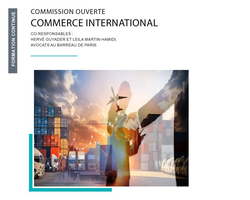
♾️ suivre Marie-Anne Frison-Roche sur LinkedIn
♾️s'abonner à la Newsletter MAFR Regulation, Compliance, Law
____
► Référence complète : M.-A. Frison-Roche, participation à la Table-Ronde sur La dynamique du Droit de la compliance, avec Clara Ingen-Housz, chief ethics and compliance officer, antitrust group legal counsel Saint-Gobain, et Hervé Guyader, avocat à la Cour et responsable de la commission Commerce international de l'Ordre des avocats du Barreau de Paris, Maison du barreau, 13 avril 2023.
____
____
présentation de l'intervention :

April 12, 2023
Publications

April 4, 2023
Thesaurus : Doctrine
► Référence complète : A. Danis-Fatôme & N. Hoffschir, "La loi sur le devoir de vigilance rendue ineffective par le juge", Revue des sociétés, 2023, p.793.
____
🦉Cet article est accessible en texte intégral pour les personnes inscrites aux enseignements de la Professeure Marie-Anne Frison-Roche
________
April 4, 2023
Newsletter MAFR - Law, Compliance, Regulation

♾️ follow Marie-Anne Frison-Roche on LinkedIn
♾️ subscribe to the Newsletter MAFR Regulation, Compliance, Law
____
► Full Reference: M.-A. Frison-Roche, "Face aux clauses de Compliance : le Juge (colloque du 7 avril 2023)" ("Facing Compliance clauses: the Judge (symposium of 7 April 2023)"), Newsletter MAFR - Law, Compliance, Regulation, 4 April 2023.
____
📧Read by freely subscribing other news of the Newsletter MAFR - Law, Compliance, Regulation
____
Compliance Law is starting to be known; mainly through two blocks:
Firstly the spectacular sanctions by which it made as its entry in Europe by the "BNPP sanction" of 2014.
🔴M.-A. Frison-Roche, 📝Le Droit de la Compliance, 2016
Secondly, the accumulation of tools, legal and non-legal, with which companies have equipped themselves: plans to detect and prevent breaches, internal investigations, mapping, ad hoc training, etc.
🔴M.-A. Frison-Roche (dir), 📘Compliance Tools, 2021
But what is the "compliance obligation" in the name of which these fearful and heavy sanctions are pronounced and these new and multiple tools are put in place?
We do not have a very clear idea.
That is why the Journal of Regulation & Compliance (JoRC) and its partner universities have chosen to focus on the topic of the Compliance Obligation in a series of symposiums held in 2023.
🔴JoRC, 🏗️L'obligation de compliance, 2023
It could be said that the company is "obliged" by Compliance because it is obliged by the Law, as Compliance would only mean obeying "regulations" (a term used to describe everything that is obligatory, from the Constitution to ethical charters, etc.). The English vocabulary "comply with" suggests this, as does the Chinese practice of Compliance. The difference would then only be the fact that the company shows its "stakeholders" that it does in fact respect all these texts that commit it.
But the practice and the jurist remember that what is sometimes considered as the heart of the Law, since Roman Law, is Obligations Law, having as its object Contract Law and Tort Law.
Yet, in practice, companies have put contracts concerning compliance everywhere, and they are relatively little studied.
🔴M.-A. Frison-Roche, 📝Contrat de compliance, clauses de compliance, 2023
These may be entire contracts whose very purpose is to entrust another with the task of fulfilling all or part of the compliance obligation incumbent on the company, with regard to personal data.
These may be clauses inserted in contracts with another purpose, for instance sales contracts in a value chain, where the company stipulates that the other company will also ensure compliance obligations for itself or for the other company, e.g. detect and prevent corruption, be vigilant, etc.
Contract Law has already taken on compliance in practice, especially in long-term economic transactions with an international dimension.
The judge has always been present in Obligation Law.
How is the triangle articulated: Judge - Compliance - Obligation?
The Judge has been present from the outset in the development of the Compliance Obligation through criminal liability, administrative liability and the obligation for the company to become a judge of itself, particularly through internal investigations.
🔴M.-A. Frison-Roche (dir.), 📘Compliance Jurisdictionalisation, 2023
The Judge is also present through Obligation Law stricto sensu, first of all through liability, which is transformed under the effect of the compliance system, which operates more in the logic of "accountability" and generates legal mechanisms of "ex ante liability".
🔴M.-A. Frison-Roche, 📝La responsabilité Ex Ante, pilier du Droit de la Compliance, 2022
In contractual matters, the Judge will intervene, in particular with regard to the stipulations which, in the contracts which form the architecture of the value chains, ensure the efficacy (and no longer only the effectiveness) of the duty of vigilance.
The Judge will then intervene under the French law of 2017, known as the "Vigilance Law",
🔴M.-A. Frison-Roche, 🚧Vigilance, Buts Monumentaux de la Compliance et "Société vigilante", 2023
but also, because the Judge is the "judge of the contract", he will intervene as such.
To identify the Obligation of Compliance,
🔴M.-A. Frison-Roche (dir.), 📘Compliance Obligation, 2024
it is therefore necessary to analyse the way in which the Judge apprehends or should in the future apprehend contracts and compliance clauses.
That's why, in the above-mentioned cycle of symposiums, a symposium is being held on 7 April 2023. It is co-organised by the Journal of Regulation & Compliance (JoRC) and the Law Faculty of Perpignan, and has been designed under the scientific direction of Walid Chaiehloudj and Marie-Anne Frison-Roche.
________
April 3, 2023
Interviews

♾️follow Marie-Anne Frison-Roche on LinkedIn
♾️subscribe to the Newsletter MAFR Regulation, Compliance, Law
____
► Full Reference: M.-A. Frison-Roche & M. Boissavy, "Colloque : « Avocat et droits de la défense dans les enquêtes internes et la justice négociée »" ("Symposium: "Lawyers and rights of the defence in internal investigations""), interview with Olivia Dufour, Actu-Juridique, 3rd April 2023.
____
💬read the interview (in French)
____
► Presentation of the interview by the journal (in French): "Le Conseil national des barreaux (CNB) organise les 20 et 21 avril prochains un colloque intitulé « Avocat et droits de la défense dans les enquêtes internes et la justice négociée ». Matthieu Boissavy, avocat aux barreaux de Paris et de New York, médiateur et vice-président de la commission Libertés et droits de l’Homme du Conseil national des barreaux et Marie-Anne Frison-Roche, professeure de droit, directrice du Journal of Regulation and Compliance nous expliquent les enjeux de ces nouvelles pratiques judiciaires qui bousculent le rôle traditionnel des acteurs de la justice, qu’il s’agisse des avocats ou des magistrats."
____
► Questions asked (in French):
- Le CNB organise les 20 et 21 avril prochains un colloque sur le thème : Avocats et droits de la défense dans les enquêtes internes et la justice négociée. Pourquoi ce choix ?
- La compliance n’est-elle pas en train de bouleverser le métier d’avocat ?
- Comment cela se traduit-il en pratique ?
- Quelles sont les implications déontologiques, ne faut-il pas inventer de nouvelles règles ?
- Qu’est-ce que la CJIP a changé dans le métier d’avocat ?
- Quels sont les nouveaux risques pour l’avocat ?
- Cela modifie-t-il les relations entre avocats, parquet et juges du siège ?
________

March 24, 2023
Publications

► Référence complète : M.-A. Frison-Roche, notes prises pour faire le rapport de synthèse du colloque de La société vigilante, 24 mars 2023.
____
► Méthode : En raison de la richesse et la diversité des propos tenus, pour tenir le temps imparti, des passages n'ont pas été repris à l'oral.
Parce qu'il s'agit d'une synthèse, le document ne s'appuie que sur les propos tenus et n'est pas doté de références techniques, ne renvoyant pas non plus à des travaux personnels.
____
► Articulation des notes prises au fur et à mesure de l'écoute des différentes interventions des orateurs successifs :
____
🔻Lire les notes prises d'une façon exhaustive ci-dessous.
March 24, 2023
Conferences
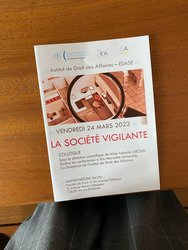
♾️ follow Marie-Anne Frison-Roche on LinkedIn
♾️subscribe Newsletter MAFR Regulation, Compliance, Law
____
► Full Reference: M.-A. Frison-Roche, "Propos introductifs : Les buts monumentaux de la vigilance" (Introductory remarks: The Monumental Goals of Vigilance), in La société vigilante ("The Vigilant Company"), Aix-Marseille University, Institut de Droit des Affaires, March 24, 2023.
____
This conference is done in French; read its English Summary below⤵️
🧮see the complete program of the manifestation (in French)
____
► English Summary of the conference: "Vigilance" is intriguing because, although it occurs in many branches of Law and is familiar in "banking compliance", in a form that is moreover reinforced since it is an obligation of vigilance on the part of the banker about a client whom he/she should "know", it is the "duty of vigilance" that made this notion famous. One could almost say scandalously famous because of a French law of 2017 that now bears its name, called the "Vigilance Law", whereas other laws bear the name of the minister who thought of it, which due diligence (vocabulary used for the European directive) does not erase.
The current challenge is to take the right measure of what "vigilance" is.
Vigilance goes beyond the French Loi Vigilance, which is not enough to express what it is in its few dispositions. To say what it is in the legal system, to use it in practice, to propose the intellectuel legal exercice of qualification, Vigilance must be thought of in Compliance Law, of which it is both a "Tool" and the most advanced point, as shown by the European Directive, whose discussions during its elaboration show these design issues.
Thus, like the whole of Compliance Law, Vigilance is understood, deployed, analysed and exercised through what underpins and gives meaning to all these constantly changing regulations, powers, and obligations, through Compliance Monumental Goals which give it stability and simplicity. This is the least that can be done in a mechanism that has the ambition to organise the "sustainability" of economic relations.
But while Vigilance expresses and concretizes Compliance Monumental Goals, it must not go beyond measure.
In fact, to set up structures, use tools and behave in such a way that human rights and nature are effectively and extraterritorially protected, both negatively and positively, these obligations of the company, which is the natural subject of the "duty", more generally the natural subject of Compliance Law, see its legal powers increased, these means being required for the company to fulfil its new obligations, first legal, then contractual, soon to be unilaterally formulated.
Perhaps we should conceive of a "vigilant company" and not just a company that, beyond and through its economic activity, cares for others and the world, but a company that "watches over" everything and on everything would be to go beyond the measure, to make companies the "regents" of the world and the people who live in it.
Faced with this perspective to be excluded, the construction of a Europe of Compliance, which does not be reduced to corruption fighting or environment protection, and draws on its humanist tradition, distinguishing itself in this respect from the American and Chinese compliance systems, is the major challenge.
Companies are not the alpha and omega, but they are one of the elements of an Alliance between the political Authorities and the population, its link, the one that allows us to escape from the limit of the territory, in what we call by this inadequate term of "extraterritoriality". It is rather a question of going beyond territories, required by the Compliance Monumental Goals of Compliance, of which Vigilance is the advanced point.
____
🚧read the English Working Paper, basis of this conference: "Vigilance, Compliance Monumental Goals, and "Vigilant Company""
____
📈see the slides created for this conference (in French)
____
📝read the article published after this conference
________
March 24, 2023
Conferences

♾️ suivre Marie-Anne Frison-Roche sur LinkedIn
♾️s'abonner à la Newsletter MAFR Regulation, Compliance, Law
____
► Référence complète : M.-A. Frison-Roche, "synthèse", in I. Grossi (dir.), La société vigilante, Université d'Aix-Marseille, Institut de Droit des Affaires, 24 mars 2023.
____
____
🧮Consulter le programme complet de cette manifestation
____
Cette réflexion finale a servi de base à un article ; La vigilance, pièce du puzzle européen. Lire le document de travail sous-jacent.
____
► Présentation de la synthèse : La synthèse du colloque a été réalisée sur le vif, à partir des notes prises au fur et à mesure du déroulement de la journée. L'écoute des uns et des autres a fait ressortir 4 points qu'il aurait été difficile d'isoler dans une partie du droit positif, parce qu'il a été manifeste que les propos ont porté parfois sur la Compliance, parfois sure l'obligation de vigilance, parfois sur le devoir de vigilance et le plus souvent sur la loi du 27 mars 2017, laquelle a donc servi de porte d'entrée à l'ensemble des réflexions. Mais elle n'a été qu'une porte d'entrée.
Le premier point est justement l'impression d'une ampleur de tantôt de "gloire" et tantôt d'"indignité" qui ont été déversées sur cette loi Vigilance. Les intervenants ont donc fortement divergé.
Le deuxième point est l'impression à l'inverse générale et commune, pour que les orateurs s'en félicitent, s'en inquiètent, s'en réjouissent ou s'en effondrent, d'un grand mouvement auquel nous assistons et que la Vigilance traduit ou/et porte.
Le troisième point est la multiplicité des branches du Droit qui sont utilisées ou touchées, là encore qu'on s'en réjouisse ou pas, et la nécessité de dépasser ces branches du Droit. Face à la Vigilance, des disciplines peuvent apparaître en opposition, tandis que des branches du Droit semblent entrer comme en résistance. La majorité des intervenants ont souligné que les branches du Droit, cette loi n'étant alors que l'expression d'un mouvement plus vaste, la Vigilance dépassant la Loi Vigilance, sont activées et transformées. Il en est ainsi du Droit international et du Droit processuel. L'idée étant que la Vigilance pourrait bien être l'expression d'une branche du Droit spécifique et nouvelle : le Droit de la compliance. Au-delà de la compréhension de ce qui se passe, l'enjeu technique est d'articuler les branches du Droit concernées, notamment dans le rapport entre dispositions spéciales et principes, entre Droit spécial et Droit commun.
Le quatrième point est l'absence de définition de la vigilance. L'on en a peu davantage entendu de ce que pourrait être une "entreprise vigilante"...L'existence d'un devoir portant sur une situation précise suffit-elle à transformer toute l'entreprise et que devient-elle alors dans son entier ? Art pratique, le Droit n'aime pas les mystères. Car comment bien manier un instrument juridique dont la définition varie, dont on ne connaît que le régime, lequel varie au gré des réglementations, diverses et changeantes, ? Peut-elle varier selon les secteurs, selon les entreprises, selon les divers contrats qui sont partout ?
Peut-être, en conclusion et comme cela fût évoqué par certains, au-delà de la directive attendue sur la Corporate Sustainability Due Diligence, c'est plus largement dans le puzzle des définitions que le Droit de l'Union européenne est en train de construire, en corrélation avec le reporting extra-financier, que l'on pourra trouver, dans la conception systémique et humaniste portant l'identité européenne, voire sa souveraineté, ce qui donne sens et simplicité à la Vigilance.
____
✏️lire les notes prises sur le vif pour opérer la synthèse
____
📝lire l'article publié suite à cette conférence
________

March 23, 2023
Publications

♾️ follow Marie-Anne Frison-Roche on LinkedIn
♾️ subscribe to the Newsletter MAFR Regulation, Compliance, Law
____
 ► Full reference: M.A. Frison-Roche, Thinking and using Vigilance through its Compliance Monumental Goals, Working Paper, March 2023.
► Full reference: M.A. Frison-Roche, Thinking and using Vigilance through its Compliance Monumental Goals, Working Paper, March 2023.
____
🎤 This Working Paper has been done as basis for the introduction of the colloquia La société vigilante ("Vigilant Company") at the Aix-Marseille University on March 24, 2023 (conference given in French)
____
📝It is also the basis of the article that introduces a special issue on La société vigilante
____
► Summary of the Working Paper: The concept of "Vigilance" is difficult to define. Probably because even as it is becoming a standard, it has just entered the legal systems. And what a splash it is! To understand it, it must not be isolated. Neither in the only French law attracting all the attention, all the fears, all the hopes, the so-called Loi Vigilance ("Vigilance Law"), nor in the only technical mechanisms that make Vigilance a reality.
Vigilance is itself only a part of a deeper movement, of which it is the advanced point, allowing us to anticipate the evolution of the whole: Compliance Law.
In this light and for not getting lost in it, because the stakes are so high that one quickly loses the measure of things, with each party lashing out at the others, so Vigilance, the key element of Compliance, requires above all alliances, that we can first examine the entry of Vigilance into the legal system and then understand it through the Monumental Goals which give the measure of it, i.e. both the scope and the limit, each one having to act within the margins that are theirs, States, companies, stakeholders, and judges.
A Will for tomorrow can then emerge today, carried by Europe.
____
🔓read the Working Paper⤵️

March 20, 2023
Publications

♾️ follow Marie-Anne Frison-Roche on LinkedIn
♾️ subscribe to the Newsletter MAFR Regulation, Compliance, Law
____
► Full Reference: M.-A. Frison-Roche, Laws, Compliance, Contracts, and Judges: places and alliances, Working Paper, March 2023.
____.
📝this working paper is the basis for an article published in French (click HERE) in the 📚chronique of Compliance Law held in the Recueil Dalloz.
____
📚Read the other articles published by this Compliance Law Chronicle. open since 2018.
____
►Summary of this Working Paper: To understand the functioning of compliance systems in the articulation of the legal actors and the legal instruments used, whatever the technical sector considered, it is necessary to put the "law", the "contract" and the "judge" back into the perspective of legitimacy and efficiency regarding what Compliance is.
At the very least, it is a 'conformity' mechanism. In this process of simple obedience, legislators, economic operators, and judges find themselves in the position of having to obey the law in a hierarchical conception.
In a more dynamic and ambitious conception, when Compliance Law is not reduced to a more astute method of obedience but draws substantial normativity from the Monumental Goals pursued, legislators and operators enter an alliance. The contract becomes a major instrument, and the Judge becomes a major actor, no longer to punish the non-obedient but to facilitate the links to help a sustainable system.
Faced with issues such as digital, climatic, and technological challenges, where we are each so weak and isolated, we must not limit our conception and practices to the instrument of conformity but choose the substantial Compliance Law, i.e. the alliance of forces, which puts forward the contract and renews the office of the judge, with the Public Authorities remaining legitimate in setting the Monumental Goals since they commit the future of the social group.
________
🔓read bellow the developments⤵️
Updated: March 15, 2023 (Initial publication: Sept. 16, 2021)
Thesaurus : Doctrine

► Full Reference: R.-O. Maistre, "What monumental goals for the Regulator in a rapidly changing audiovisual and digital landscape?", in M.-A Frison-Roche (ed.), Compliance Monumental Goals, series "Compliance & Regulation", Journal of Regulation & Compliance (JoRC) and Bruylant, 2023, p.
___
► Article Summary (done by the JoRC editor): In France, since the law of 1982 which put an end to the State monopoly on the audio-visual area, the landscape has profoundly evolved and diversified. In view of the multitude of players who are now established there, the Conseil supérieur de l'audiovisuel - CSA (French High Audiovisual Council) must ensure the economic balance of the sector and the respect for pluralism, in the interest of all audiences. The growing societal responsibilities of audiovisual media and new digital players have multiplied the "monumental goals" on which the Arcom is watching.
Its competences have gradually been extended to the digital space and the successive laws concerning its missions aim at new objectives, in particular in terms of protection of minors, fight against online hate or against disinformation. The emergence of a new European model of Regulation makes it possible to give substance to these additional goals, the Regulator adopting a systemic perspective and calling on soft law tools to fulfill its new missions.
____
________
Updated: March 15, 2023 (Initial publication: Oct. 14, 2021)
Publications

► Full Reference: M.-A. Frison-Roche, " Definition of Proportionality and Definition of Compliance Law", in M.-A. Frison-Roche (ed.), Compliance Monumental Goals, series "Compliance & Regulation", Journal of Regulation & Compliance (JoRC) and Bruylant, 2023, p.
___
► Article Summary: The use of Proportionality t always limit powers is only justified when it is about sanctions, but sanctions are only one tool among others in Compliance Law, intended moreover to have little place in this Ex Ante branch of Law. And returning to the very nature of Compliance Law, which relies on operators, private or public, because they are powerful, then using proportionality to limite powers is detrimental to Compliance Law.
However, nothing requires that. Compliance Law is not an exception that should be limited. On the contrary, it is a branch of Law which carries the greatest principles, aimed at protecting human beings and whose Normativity lies in its "Monumental Goals": detecting and preventing future major systemic crisis (financial, health and climate ones).
However, literally the principle of Proportionality is: "no more powers than necessary, as many powers as necessary".
The second part of the sentence is independent of the first: this must be used.
Politics having fixed these Monumental Goals, the entity, in particular the company, must have, even tacitly, "all the necessary powers" to achieve them. For example, the power of vigilance, the power of audit, the power over third parties. Because they are necessary to fulfill the obligations that these "crucial operators" must perform as they are "in a position" to do so.
So instead of limiting the powers, the Principe of Proportionality comes to support the powers, to legitimize them and to increase them, so that we have a chance that our future is not catastrophic, perhaps better.
In this respect, Compliance Law, in its rich Definition, will itself have enriched the Principle of Proportionality.
____
🚧read the Working Paper, with technical developments, references, and hypertext links.
____
📘go to the general presentation of the book in which this article is published
____
► read the presentations of the other Marie-Anne Frison-Roche's contributions in this book:
📝Compliance Monumental Goals, beating heart of Compliance Law,
📝 Role and Place of Companies in the Creation and Effectiveness of Compliance Law in Crisis,
📝 Assessment of Whistleblowing and the duty of Vigilance
________
March 15, 2023
Publications

♾️ follow Marie-Anne Frison-Roche on LinkedIn
♾️ subscribe to the Newsletter MAFR Regulation, Compliance, Law
____
► Full Reference: M.-A. rison-Roche., "The Principle of Active Systemic Proximity, a corollary of the renewal of the Principle of Sovereignty by Compliance Law", in M.-A. Frison-Roche (ed.), Compliance Monumental Goals, series "Compliance & Regulation", Journal of Regulation & Compliance (JoRC) and Bruylant, to be published.
,___
____
► Summary of this Article: Surprisingly, it is often in a quarrelsome, angry, dissatisfied tone that we first speak of Compliance, especially when Compliance takes a legal form, because it is then we talk about sanctions coming from afar. These sanctions would strike both extremely hard and in an illegitimate way, Law only therefore takes its part in Compliance to increase its brutality: the Law is what would prolong the war between States to better hit this kind of civilian population that would be the companies..., in a new kind of "planetary total war"...
Why so much detestation, which can only be generated by such a presentation?
Because, thanks to the power of Law, Compliance would therefore be the means for a State, finally found, to meddle in the affairs of others to serve its own interests, including those of its companies, to go to war against other States and to the companies they care about without even having to formally declare the war to them. Compliance Law would finally allow a State that is not even a strategist, just smarter, to leave its territory to regulate others. It is true that it seems even more exasperating that it would also be under the guise of virtue and good purposes. Thus, it is not possible to count the number of the writings that describe and comment on the occurrences of the expression "Trojan horse", "economic war", etc. There are thus more articles on this subject of Compliance Law as a means of going to dictate to subjects of law who are nevertheless subject to other legal systems their behavior and to sanction them for having failed to do so, than on all other technical Compliance matters.
As soon as the term "extraterritoriality" is dropped, the knives are drawn. The dejection of defeat... because who can fight against American power, American Law seducing everyone? The call for resistance, or at the very least for "reaction"... In any case, it would be necessary to put the analysis back on its true terrain: politics, conquest, war, so leaving the legal technique there, area which would be good for the naive and above all count the divisions amassed on each side of the borders, then note that only the United States would have had the ingenuity to count many of them, with their armada of judges, prosecutors and lawyers, with Compliance Law amassed like so many gold coins since the 1930s, American companies relaying the assault by internalizing Compliance Law through internal codes, law that is "soft" only in name, and community standards governing the planet according to American principles, the solution then consisting of line up as many of them as possible in reaction, then attempt to "block" the assault. Because if there is no Global Law, Compliance Law would have succeeded in globalizing American Law.
The technique of blocking laws would therefore be the happy outcome on which the forces should concentrate to restore "sovereignty", since Europe had been invaded, by surprise by some famous texts (FCPA) and some cases whose evocation (BNP case) to the French ear sounds like a Waterloo. Compliance Law would therefore only be a morne plaine...
But is this how we should understand the notion of Sovereignty? Has the so-called question of "the extraterritoriality of Compliance Law" not been totally biased by the question, certainly important but with both very precise and extremely specific outlines, of embargoes which have almost not related to Compliance Law?
The first thing to do is therefore to see more clearly in this kind of fight of extraterritoriality, by isolating the question of embargoes from other objects which should not be assessed in the same way (I).
This done, it appears that where Compliance Law is required, it must be effectively indifferent to the territory: because Compliance Law intervenes where the territory, in the very concrete sense of the land in which we are anchor is not present in the situation to be governed, situation to which our minds have so much difficulty adapting and which, however, is now the most common situation: finance, space, digital. If we want the idea of civilization to remain there, that the notion of "limit" be central there. However, Sovereignty is not linked to omnipotence, it is the grandchildren who believe that, it is on the contrary linked to the notion of limits (II).
But if the limit had been naturally given to human beings by the territory, the ground on which we walk and the border on which we stumble and which protects us from aggression, if the limit had been naturally given to human beings by death and the oblivion into which our body and our imagination eventually fall. Indeed, technology erases both natural limits. The Law was the very reflection of these limits, since it was built on the idea of life and death, with this idea that, for example, we could no longer continue to live after our death. Digital technology could challenge this. In the same way, Law had in the same "natural" way reflected the terrestrial borders, since Public International Law being internal Public Law, took care that each sovereign subject remained in its terrestrial borders and did not go beyond, without the agreement of others, Public International Law organizing both the friendly reception of the other, by treaties and diplomacy, as well as unfriendly entry, by the Law of War, while Private International Law welcomes foreign legal systems if a extraterritorial element is already present in the situation.
The complexity of the rules and the subtlety of the solutions do not modify the solidity of this base, always linking the Law to the material reality of this world which are our bodies, which appear and disappear and our "being" with them, and the earth squared by borders. Borders have always been crossed, International Commercial Law being only an economic and financial translation of this natural taste for travel which does not question the territory, human beings passing from one to another.
But the Global has arrived, not only in its opportunities, being not an issue because one can always give up the best, but also in global risks whose birth, development and result are not mastered and of which it is not relevant to thinking only of repairing the damage, because preventing risks from degenerating into a systemic catastrophe is what is at stake today. What if territory slips away and hubris seizes human beings who claim that technology could be the new wings leading a fortunate few to the sun of immortality? We could go towards a world that is both catastrophic and limitless, two qualifiers that classical philosophers considered identical.
Law being what brings measure, therefore limits in a world which, through technology, promises to some the deliverance of all these "natural" limits, could, by the new branch of Compliance Law, again inserting limits to a world which, without this contribution, would become disproportionate, some being able to dispose of others without any limit: in doing so, Compliance Law would then become an instrument of Sovereignty, in that it could impose limits, not by powerlessness but on the contrary by the force of Law. This explains why Compliance is so expressly linked to the political project of "Digital Sovereignty".
To renew this relationship between Law and Sovereignty, where the State takes a new place, we must think of new principles. A new principle is proposed here: the Principle of "Proximity", which must be inserted into the Ex-Ante and systemic Law that is Compliance Law. Thus inserted, the Principle of Proximity can be defined in a negative way, without resorting to the notion of territory, and in a positive way, to posit as being "close" what is close systemically, in the present and in the future, Compliance Law being a branch of Systemic Law having as its object the Future.
Thus, thinking in terms of Proximity consists of conceiving this notion as a Systemic Principle, which then renews the notion of Sovereignty and founds the action of entities in a position to act: Companies (III).
If we think of proximity not in a territorial way, the territory having a strong political dimension but not a systemic dimension, but if we think of systemic proximity in a concrete way through the direct effects of an object whose situation immediately impacts ours (as in the climatic space, or in the digital space), then the notion of territory is no longer primary, and we can do without it.
If the idea of Humanism should finally have some reality, in the same way that a company donneuse d'ordre ("order giver") has a duty of Compliance regarding who works for it, this again meets the definition of Compliance Law as the protector of human beings who are close because they are internalized in the object consumers take. It is this legal technique that allows the transmission, with the thing sold, of the procedural right of action for contractual liability.
Therefore, a Principle of Active Systemic Proximity justifies the action of companies to intervene, in the same way that public authorities are then legitimate to supervise them in the indifference of the formal legal connection, principe of indifference already functioning in the digital space and in environmental and humanist vigilance.
It is therefore appropriate to no longer be hampered by what is a bad quarrel of the extraterritoriality of Compliance Law (I), to show the consubstantial Indifference to the territory of this new branch of Law (II) and to propose the formulation of a new Principle: the "Principle of Active Systemic Proximity (III).
____
► See the general presentation of the book, 📘Compliance Monumental Goals, in which this article will be published
____
► read the presentations of the other Marie-Anne Frison-Roche's contributions in this book:
📝Compliance Monumental Goals, beating heart of Compliance Law,
📝Definition of Principe of Proportionality and Definition of Compliance Law,
📝 Assessment of Whistleblowing and the duty of Vigilance
___
March 15, 2023
Thesaurus : Doctrine
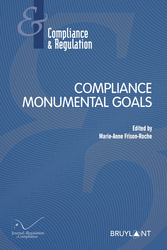
► Full Reference: A. Le Goff, "Monumental Goals Perceived by the Firm: Serene Business or Business under Pressure?", in M.-A. Frison-Roche (ed.), Compliance Monumental Goals, coll. "Compliance & Regulation", Journal of Regulation & Compliance (JoRC) and Bruylant, 2023, p. 83-90.
____
📘read a general presentation of the book, Compliance Monumental Goals, in which this article is published.
____
► Summary of the article:
________